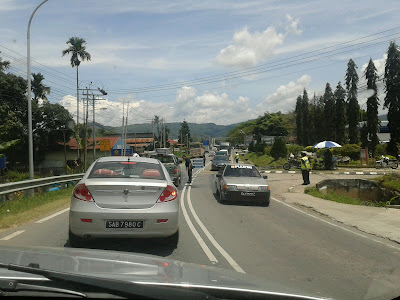I work in some beautiful schools in rural Sabah. The teachers are committed, the children are bright and starry-eyed, the grounds are invariably a wonderland of ponds and flowers and orchids.
There's just one thing that gets me down: the libraries. The libraries - although cared for by the teachers -are full of cheap books that are way above the heads of most of the students, illustrated with dated depictions of life in the 1970s which don't support the actual text, usually falling apart through intensive use and/or the general mould-inducing climate of Borneo. Some schools have a box of books donated by the New Zealand government a couple of decades ago - these would not now be used in New Zealand, and there's no reason my schools should have to settle for lower quality books than those used in our own countries. Some books are so moralistic that they do not encourage reading for pleasure.
I'm asking you to please consider contributing a book or two to one of my schools. I am here for another 6 months, and all books received will be distributed fairly* amongst the five schools I work with. I will also give support to the teachers in using these books, and make sure that they don't end up being cosseted in a box in the librarian's office, and never given to the children - which has happened in the past, when donors demanded that the books be kept in excellent condition (what beloved children's book is ever in an excellent condition?!)
There are a few ways that you can donate books.
- You can send me a gift certificate for Fishpond, Amazon UK or Better World Books. You can buy gift cards for as little as you like - any amount will help us, even if it's just £1. The certificate codes will be distributed amongst the schools, and teachers will be able to choose high quality books for themselves.
- You can buy a specific book from Amazon, Book Depository (free delivery to Malaysia), Better World Books, or Thrift Books (or another site of your choice) and request shipping directly to me. Please let me know if you need an address. We have created a wishlist here, although of course you are not restricted to buying only these books!
- You can buy books in charity shops or bookshops, or through Amazon's second-hand offers, or raid your old and no-longer-used bookshelf, and send them to us - I will provide you with an address, and distribute the books to the schools.
- If you are interested in supporting local Malaysian writers and illustrators, you can buy books through Silverfish Books - we love anything by Yusof Gajah, Margaret Lim, and Jainal Amambing.
If you would like to buy or donate books directly (rather than buying a gift certificate), please see the list below of authors that would go down well with the ESL learners in my schools. We would love you to put your name inside the front cover, to let schools know who the book was donated by. The children here are fascinated by foreign children - if your children are sending a book, please feel free to include a photo of them reading the book, to give our students a sense of connection to the previous owners. You could also do this if you are a teacher, and your class sends a book.
What do you get back? We guarantee you a warm feeling in your heart! We also promise, if you send us your e-mail address with your donation, to send you some photos of the kids enjoying your books.
Our Desirable Authors (not a complete list!)
- Eric Carle
- Bill Martin, Jr.
- Julia Donaldson
- Yusof Gajah
- Janet & Allen Ahlberg
- Oliver Jeffers
- Nick Sharrett
- Margaret Lim
- Raymond Briggs
- Jill Murphy
- Rod Campbell
- David Wiesner (wordless books)
- Valerie Thomas
- Lucy Cousins (Maisy series)
- Lift the Flap Fairy Tales (Macmillan publishers)
- Books from Macmillan's Children's Readers series
- Any books with simple, repetitive language and bright pictures
Please do not send:
- Books without pictures: very few primary school children are able to read these, in my schools. If you would like to donate these, please let me know and I will provide you with the address of a local high school who would appreciate them.
- Older books with lots of old-fashioned text (we already have plenty of these!)
- Books with pigs as main characters - these are very unpopular, even with non-Muslim children.
- Religious books - for obvious reasons.
- Ladybird books - these are available in Malaysia quite cheaply.
Contacting me
Please e-mail me if you would like to donate.
Or, you could leave a comment below.
*The Power of Reading Programme
One of my schools has already been accepted to the Power of Reading Programme, and won't be receiving any books from this appeal, unless there is a large response (fingers crossed!) You can find out more about the incredible impact this programme is having on schools in Borneo in the video below - this impact is the reason I want the rest of my schools to benefit from floods of great books :)















